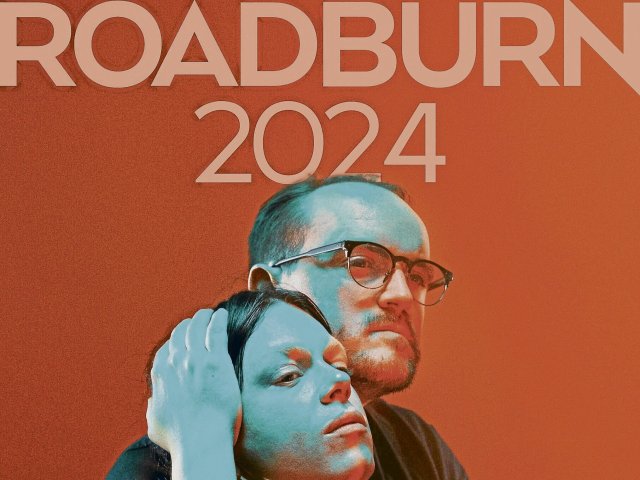See me, feel me, touch me, heal me: This is how the festival sees itself.
Photo: roadburn.com
The first concert on the main stage of Roadburn 2024 in Tilburg, Netherlands last weekend: heavy beats, bass that vibrates the whole body, no guitars, rap. Later in the set, a woman takes the stage and sings like Nina Simone. Clipping is the name of the formation from Los Angeles, reinforced by singer Sharon Udoh, who will be on stage with the trio for the first time this evening. Not exactly what you would expect at a festival that was founded 25 years ago by two stoner rock enthusiasts and quickly became an important date for tolerant metal fans.
Exclusive shows, programs curated by artists, exhibitions and panel discussions accompany the program, which can be experienced partly on two stages and partly in various rooms on a former railway site, where the last money is spent on “merch”, i.e. for T-shirts, records and CDs (recently also increasingly music cassettes) and the like can be issued. The term “boutique festival” has recently been circulating as a generic term for events of this type, which do not simply book the hottest bands together, but rather put together the program with care and a sense of larger concepts. There is often context in the form of exhibitions, readings and panels.
This time, Roadburn was, among other things, about the healing power of heavy music. What the musicians from Agriculture, Death Goals and Ragana had to contribute to the topic wasn’t particularly fruitful. The main findings: Subcultures such as the hardcore or metal scene can be a “safe space” for those who do not feel comfortable in mainstream society, for example because of their sexual orientation. Heavy music makes it possible to express negative feelings. And the mosh pit can be a place of catharsis. It’s interesting that, according to Leah Levinson from Agriculture, a disproportionate number of trans women are active in the black metal scene. The Roadburn audience is mostly male and no longer very young, but a tendency towards diversity can hardly be overlooked; in addition to the dominant black scene, there was a flash of colorful and non-binary.
Which has its counterpart in the program. Roadburn no longer sees itself as a metal or hardcore festival, but rather as a place for “heavy music” in general. A headliner like The Jesus & Mary Chain, who were successful in the mid-80s with feedback-filled noise pop, also fits into the program. Or the experimental pop band Xiu Xiu, the guitarist Hedvig Mollestad, who actually comes from jazz, and the British folk innovator Richard Dawson, who were booked this year alongside bands with funny names like Thantifaxath, Wiegedood, Dödsrit and Hexvessel.
Dawson was able to see that the audience appreciated the wide range of styles, and he confessed his relief that the quirky ballads, which the excellent guitarist breaks out with free digressions, also appealed to an audience that otherwise probably has a more conventional concept of heavyness. There has always been a tendency in the scene towards folk in general and musicians like Kate Bush and Suzanne Vega.
At the other end of the sound spectrum, Khanate, who were announced as the second main attraction of this year’s Roadburn, rummaged around in the frequency cellar on Saturday evening. Founded a quarter of a century ago by Stephen O’Malley, who with Sunn O))) is largely responsible for making heavy metal accessible to hipsters in a broader sense, and the busy musician and producer James Plotkin, the quartet is also slowing down Drummer Tim Wyskida (Blind Idiot God) and vocalist Alan Dubin (OLD) are part of rock music almost to a standstill. The band’s first appearance in almost 20 years clearly demonstrated that no other band since then has produced riffs that are as consistently heavy as they are abstractly twisted, over which Dubin screams dark mantras that make you lose your nerves.
Of course, a lot fits between Dawson and Khanate: a lot of black metal, gothic kitsch by Chelsea Wolfe, the elegiac instrumental rock music of the Grails, but also electronic designs, a performance by the British-Iranian psychedelic artist Kavus Torabi, a commissioned composition from the ambient electronic project Die Wild hunt for the renowned Dutch Metropole Orkest, a little stoner rock and a lot more.
Perhaps most cathartic is the performance by Zambian-Canadian transgender rapper Backxwash, announced just that evening. All alone in a long white dress, she takes the main stage and, over a soundtrack of metal, hip-hop, industrial and a few other things, talks about encounters with the devil in the mosh pit, about trauma and the longing for redemption. On the one hand, the devil in the mosh pit is of course a comic figure, but at the same time it’s not just that: in Backxwash’s lyrics, black magic, demons and the like play an important role, along with the hope for redemption, which seems almost impossible to achieve. A cathartic performance. Unfortunately, that’s something that can’t be said about The Jesus & Mary Chain. The white noise of their legendary debut »Psycho Candy« has long since been confined to indie rock channels, the once so beguiling contrast between honeyed melodies and screaming feedback seemed washed out, the intensity that the band once exuded was, at least on this evening, at its best to guess. But not everything can work.
Become a member of the nd.Genossenschaft!

Since January 1, 2022, the »nd« will be published as an independent left-wing newspaper owned by the staff and readers. Be there and support media diversity and visible left-wing positions as a cooperative member. Fill out the membership form now.
More information on www.dasnd.de/genossenschaft
judi bola online judi bola online sbobet sbobet88
